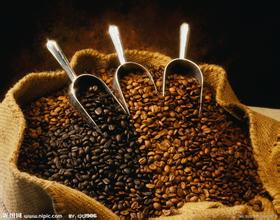Description of Golden Manning Coffee Flavor introduction to the regional treatment of manor production
Description of Golden Manning Coffee Flavor introduction to the regional treatment of manor production
In the 17th century, the Dutch first introduced Arabica saplings to Ceylon (present-day Sri Lanka) and Indonesia. In 1877, a large-scale disaster hit the Indonesian islands, coffee rust destroyed almost all the coffee trees, people had to give up Arabica, which had been in operation for many years, and introduced the disease-resistant Robusta coffee tree from Africa. Indonesia today is a big coffee producer. Coffee is mainly produced in Java, Sumatra and Sulawi, with Robusta accounting for 90% of the total production. Sumatra Manning is a rare Arabica species. Planted on hillsides between 750m and 1500 m above sea level, the mysterious and unique Sumatran species give Mantenin coffee a rich aroma, rich taste, strong flavor, slightly chocolate and syrup flavor.
Manning Coffee
Mantenin has a strong taste, with a strong mellow and rich and lively sense of movement, neither astringent nor sour, mellow and bitter can be fully revealed. The appearance of Mantenin coffee beans is arguably the ugliest, but coffee fans say that the worse the Sumatran coffee beans are, the better, mellow and slippery they are. In addition to the mellow taste of Indonesian coffee, there is also a bitter sweet taste, sometimes mixed with a touch of mildew, which is popular with people who like to drink concentrated roasted coffee. Sumatra manning coffee is called "classic" because it is stored in the cellar for three years before export. But the collection coffee is not old coffee, but slightly pale coffee through special treatment, this kind of coffee is more full-bodied, the acidity will decrease, but the mellowness will increase, the finish will be longer, and will bring a strong spicy flavor, sometimes sour, sometimes walnut, sometimes chocolate. Before Blue Mountain Coffee was discovered, Manning was regarded as the best coffee.
Manning coffee is considered to be the most mellow coffee in the world. When tasting Mantenin, you can feel obvious lubrication on the tip of the tongue and low acidity, but this acidity can also be obviously tasted. Leaping slight acid mixed with the richest aroma, so that you can easily feel the lively factor in the mild fragrance. In addition, the coffee has a faint earthy aroma, which some describe as herbal aroma sellers who often mark Lintong Lindong and Mandheling Manning coffee as dry. In fact, the pulp and coffee seeds are often separated by a variety of mixing modes, and the more common is a backyard wet treatment. The smart farmer put the freshly picked coffee cherries into a simple peeling machine made of scrap metal, wood and bicycle parts. Then put the peeled sticky beans in a plastic woven bag to ferment overnight. The next morning the soft pulp and slime that had been fermented were manually washed away. The silver-coated coffee is pre-dried on a sheet in the front yard and sent to the middleman's warehouse to remove the silver skin and further dry. Finally, the coffee was trucked to Port Medan in Medan, the capital of Sumatra, for the third and final drying. It is also reported that in other Mandheling Mantenin producing areas, after peeling, the sticky material is allowed to dry and attach to the beans, just like the semi-washing treatment in Brazil. Then use a machine to remove the sun-dried sticky and silver skin. Finally, it goes through the same two-stage drying, first in the middleman's warehouse and then in the exporter's warehouse in Medan's port of Medan.
The processing process and Sumatran characteristics. I describe these treatments in such detail because it is not clear how the soil and atmosphere and the unusual treatment techniques and the three-stage drying each affect the formation of the characteristics of Lindong and Manning coffee. Only one thing is certain. These treatments occasionally produce excellent coffee and are extremely unstable. Only through the merciless selection in the Medan port exporter's warehouse can the deep texture and unique and low-key rich taste of Lintong Lindong and Mandheling Mantenin emerge from the interference of other smells.

Important Notice :
前街咖啡 FrontStreet Coffee has moved to new addredd:
FrontStreet Coffee Address: 315,Donghua East Road,GuangZhou
Tel:020 38364473
- Prev

Introduction to Manor Grinding Calibration method for Flavor description of Kenyan Coffee Bean Flavor
Kenya Coffee Bean Flavor description Manor Grinding scale treatment method following the above, after flushing out the smoldering powder layer and winding inward to the third concentric circle, the water flow increases to 150% of the previous smallest flow. You will see that the powder below will continue to arch up, indicating a strong stirring, and then slowly inject water in the third concentric circle (note that it is a slow circle), about 4-5 times.
- Next

Coffee originates from Ethiopian coffee bean variety brand manor region taste introduction
Coffee originates from Ethiopian coffee bean variety brand manor area. 1. Limu coffee grows between 1400 meters and 2000 meters above sea level. Wash the coffee. Excellent quality, with strong nut aromas, suitable acidity, with the intensity of wine. The annual output is 29000 tons. 2. Jima Coffee grows between 1400 and 1800 meters above sea level. Sun-baked coffee. Slight acid, yes
Related
- Detailed explanation of Jadeite planting Land in Panamanian Jadeite Manor introduction to the grading system of Jadeite competitive bidding, Red bid, Green bid and Rose Summer
- Story of Coffee planting in Brenka region of Costa Rica Stonehenge Manor anaerobic heavy honey treatment of flavor mouth
- What's on the barrel of Blue Mountain Coffee beans?
- Can American coffee also pull flowers? How to use hot American style to pull out a good-looking pattern?
- Can you make a cold extract with coffee beans? What is the right proportion for cold-extracted coffee formula?
- Indonesian PWN Gold Mandrine Coffee Origin Features Flavor How to Chong? Mandolin coffee is American.
- A brief introduction to the flavor characteristics of Brazilian yellow bourbon coffee beans
- What is the effect of different water quality on the flavor of cold-extracted coffee? What kind of water is best for brewing coffee?
- Why do you think of Rose Summer whenever you mention Panamanian coffee?
- Introduction to the characteristics of authentic blue mountain coffee bean producing areas? What is the CIB Coffee Authority in Jamaica?

